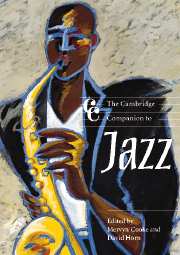10 - 1959: the beginning of beyond
from Part Three - Jazz changes
Published online by Cambridge University Press: 28 September 2011
Summary
The idea for this chapter came from Mervyn Cooke's suggestion that we jointly organise a seminar – on jazz in 1959 – at the University of Nottingham. As soon as I began I found the choice of year felicitous both as a decisive cultural moment in establishing an autonomous art-form and as a year for musical landmarks recorded in every style of jazz (from mainstream to avant-garde). Nineteen fifty-nine was the year when jazz, as it is now, began. Jazz before this time is now largely regarded as historic, as music usually identified by regional (e.g., Harlem school, Chicago style) and temporal (early jazz, Swing Era) associations. From 1959 onwards, it more strongly resembles universal current practice, indicating – and without condescension to pre-1959 jazz – that this is the beginning of contemporary jazz. This is easily demonstrated by the still pervasive familiarity of certain of the recordings made in that year. Kind of Blue (Miles Davis), Time Out (Dave Brubeck), Giant Steps (John Coltrane) and Ornette Coleman's The Shape of Jazz to Come are albums that can scarcely be unknown or un-owned by jazz aficionados – and the 1960s had not even officially begun. Perhaps they began when John F. Kennedy was elected to the US Presidency and Robert Frost read his poetry at the Inauguration ceremony. In his speech, the young president raised the image of a relay in which ‘the torch has been passed to a new generation of Americans’. This was turnover time in American culture and politics, as it was in jazz.
- Type
- Chapter
- Information
- The Cambridge Companion to Jazz , pp. 175 - 201Publisher: Cambridge University PressPrint publication year: 2003
- 3
- Cited by



